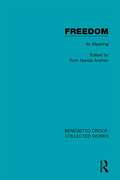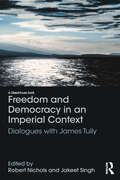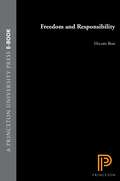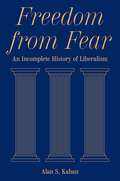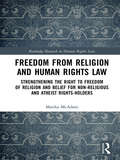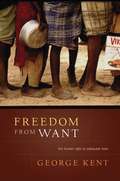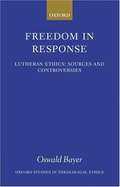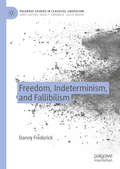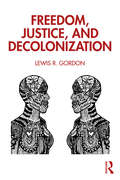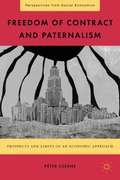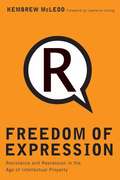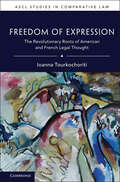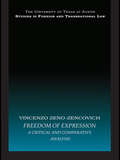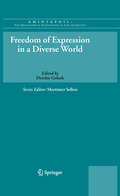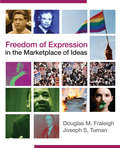- Table View
- List View
Freedom: Its Meaning (Collected Works)
by Ruth Nanda AnshenOriginally published in 1942 this book brings together contribution from some of the finest thinkers and philosophers of the 20th century such as Boas, Croce, Einstein, Haldane, Mann, and Russell. The volume discusses the problem of Freedom from diverse points of view and offers a synthesis of issues and conclusions relating to freedom as a basis for action with a view to try and fill the gaps existent in the study of the nature of Man.
Freedom and Democracy in an Imperial Context: Dialogues with James Tully
by Robert Nichols Jakeet SinghFreedom and Democracy in an Imperial Context: Dialogues with James Tully gathers leading thinkers from across the humanities and social sciences in a celebration of, and critical engagement with, the recent work of Canadian political philosopher James Tully. Over the past thirty years, James Tully has made key contributions to some of the most pressing questions of our time, including: interventions in the history of moral and political thought, contemporary political philosophy, democracy, citizenship, imperialism, recognition and cultural diversity. In 2008, he published Public Philosophy in a New Key, a two-volume work that promises to be one of the most influential and important statements of legal and political thought in recent history. This work, along with numerous other books and articles, is foundational to a distinctive school of political thought, influencing thinkers in fields as diverse as Anthropology, History, Indigenous Studies, Law, Philosophy and Political Science. Critically engaging with James Tully’s thought, the essays in this volume take up what is his central, and ever more pressing, question: how to enact democratic practices of freedom within and against historically sedimented and actually existing relationships of imperialism?
Freedom and Fulfillment: Philosophical Essays
by Joel FeinbergDealing with a diverse set of problems in practical and theoretical ethics, these fourteen essays, three of them previously unpublished, reconfirm Joel Feinberg's leading position in the field of legal philosophy. With a clarity and humor that will be familiar to readers of his other works, Feinberg writes on topics including "wrongful life" suits in the law of torts, or whether there is any sense in the remark that a person is so badly off that he would be better off not existing at all; the morality of abortion; educational options; free expression; civil disobedience; and the duty of easy rescue in criminal law. He continues with a three-part defense of moral rights in the abstract, a discussion of voluntary euthanasia, and an inquiry into arguments of various kinds for not granting legal rights in enforcement of a person's acknowledged moral rights. This collection concludes with two essays dealing with concepts used in appraising the whole of a person's life: absurdity and self-fulfillment, and their interplay.
Freedom and Responsibility
by Hilary BokCan we reconcile the idea that we are free and responsible agents with the idea that what we do is determined according to natural laws? For centuries, philosophers have tried in different ways to show that we can. Hilary Bok takes a fresh approach here, as she seeks to show that the two ideas are compatible by drawing on the distinction between practical and theoretical reasoning.Bok argues that when we engage in practical reasoning--the kind that involves asking "what should I do?" and sifting through alternatives to find the most justifiable course of action--we have reason to hold ourselves responsible for what we do. But when we engage in theoretical reasoning--searching for causal explanations of events--we have no reason to apply concepts like freedom and responsibility. Bok contends that libertarians' arguments against "compatibilist" justifications of moral responsibility fail because they describe human actions only from the standpoint of theoretical reasoning. To establish this claim, she examines which conceptions of freedom of the will and moral responsibility are relevant to practical reasoning and shows that these conceptions are not vulnerable to many objections that libertarians have directed against compatibilists. Bok concludes that the truth or falsity of the claim that we are free and responsible agents in the sense those conceptions spell out is ultimately independent of deterministic accounts of the causes of human actions.Clearly written and powerfully argued, Freedom and Responsibility is a major addition to current debate about some of philosophy's oldest and deepest questions.
Freedom and Tenure in the Academy
by William W. Van AlstyneQuestions of academic freedom--from hate speech to the tenure structure--continue to be of great urgency and perennial debate in American higher education. Originally published as a special issue of Law and Contemporary Problems (Summer 1990), this volume draws together leading scholars of law, philosophy, and higher education to offer a fresh assessment of the founding principles of academic freedom and to define this crucial topic for the 1990s. The original 1940 Statement of Principles on Academic Freedom and Tenure, which has been influential in determining institutional practices for the last half century, has required continual redefinition since its initial declaration. The volume begins with two overview articles: the most complete examination of the 1940 Statement ever provided (shedding light on some of its most troublesome clauses) and a historical review of the extent to which academic freedom has been accepted into domestic constitutional law. Subsequent articles address a range of issues related to academic freedom: the relationship between tenure and academic freedom; tenure and labor law; ideology and faculty selection; freedom of expression and the arts on campus; the boundaries defining hate speech and offensive expression; the clash between institutional and individual claims of academic freedom; and the practices of religious colleges in the United States.Contributors. Ralph S. Brown, Matthew W. Finkin, Jordan E. Kurland, Michael W. McConnell, Walter P. Metzger, Robert M. O'Neil, David M. Rabban, Rodney A, Smolla, Janet Sinder, Judith Jarvis Thomson, William W. Van Alstyne
Freedom and the End of Reason: On the Moral Foundation of Kant's Critical Philosophy
by Richard L. VelkleyIn Freedom and the End of Reason, Richard L. Velkley offers an influential interpretation of the central issue of Kant’s philosophy and an evaluation of its position within modern philosophy’s larger history. He persuasively argues that the whole of Kantianism#151;not merely the Second Critique#151;focuses on a #147;critique of practical reason” and is a response to a problem that Kant saw as intrinsic to reason itself: the teleological problem of its goodness. Reconstructing the influence of Rousseau on Kant’s thought, Velkley demonstrates that the relationship between speculative philosophy and practical philosophy in Kant is far more intimate than generally has been perceived. By stressing a Rousseau-inspired notion of reason as a provider of practical ends, he is able to offer an unusually complete account of Kant’s idea of moral culture.
The Freedom Bible: An A-to-Z Guide to Exercising Your Individual Rights, Protecting Your Privacy, Liberating Yourself from Corporate and Government Overreach
by Ted AdamsLearn How to Protect Your Family&’s Freedom!Freedom is the foundation on which America was born and continues to thrive. If you believe in the strength of freedom as more than an ideal, you can find smart ways to exercise it in all parts of your life! The Freedom Bible is your A-to-Z guide to knowing your individual rights and seeking more control and freedom through the decisions you face every day.Own healthcare decisions for you and your familyMake choices that direct your dollars where you want—for example, made in America, not overseasKnow your options to challenge governing boards—from home ownership associations to school boardsReduce your reliance on &“the grid&”Escape the invasiveness of all kinds of technologyGuard your privacy and free speech on social mediaAnd much more!Get freedom from…· Big Government· Big Tech· Dependence on Overseas Goods· Employer &“Requirements&”· HOAs· Social media jail· Spam callers· Taxes· And More!
Freedom Bound: Law, Labor, and Civic Identity in Colonizing English America, 1580–1865
by Christopher TomlinsFreedom Bound is about the origins of modern America - a history of colonizing, work and civic identity from the beginnings of English presence on the mainland until the Civil War. It is a history of migrants and migrations, of colonizers and colonized, of households and servitude and slavery, and of the freedom all craved and some found. Above all it is a history of the law that framed the entire process. Freedom Bound tells how colonies were planted in occupied territories, how they were populated with migrants - free and unfree - to do the work of colonizing and how the newcomers secured possession. It tells of the new civic lives that seemed possible in new commonwealths and of the constraints that kept many from enjoying them. It follows the story long past the end of the eighteenth century until the American Civil War, when - just for a moment - it seemed that freedom might finally be unbound.
Freedom Bound: Law, Labor, and Civic Identity in Colonizing English America, 1580-1865
by Christopher TomlinsFreedom Bound is about the origins of modern America - a history of colonizing, work, and civic identity from the beginnings of English presence on the mainland until the Civil War. It is a history of migrants and migrations, of colonizers and colonized, of households and servitude and slavery, and of the freedom all craved and some found. Above all it is a history of the law that framed the entire process. Freedom Bound tells how colonies were planted in occupied territories, how they were populated with migrants - free and unfree - to do the work of colonizing, and how the newcomers secured possession. It tells of the new civic lives that seemed possible in new commonwealths, and of the constraints that kept many from enjoying them. It follows the story long past the end of the eighteenth century until the American Civil War, when - just for a moment - it seemed that freedom might finally be unbound.
Freedom for the Thought That We Hate: A Biography of the First Amendment
by Anthony LewisMore than any other people on earth, we Americans are free to say and write what we think. The press can air the secrets of government, the corporate boardroom, or the bedroom with little fear of punishment or penalty. This extraordinary freedom results not from America’s culture of tolerance, but from fourteen words in the constitution: the free expression clauses of the First Amendment. In Freedom for the Thought That We Hate, two-time Pulitzer Prize-winner Anthony Lewis describes how our free-speech rights were created in five distinct areas--political speech, artistic expression, libel, commercial speech, and unusual forms of expression such as T-shirts and campaign spending. It is a story of hard choices, heroic judges, and the fascinating and eccentric defendants who forced the legal system to come face to face with one of America’s great founding ideas.
Freedom from Fear: An Incomplete History of Liberalism
by Alan S. KahanA provocative new history of liberalism that also provides a road map for today’s liberalsFreedom from Fear offers a striking new account of the dominant political and social theory of our time: liberalism. In a pathbreaking reframing of the historical debate, Alan Kahan charts the development of Western liberalism from the late eighteenth century to the present. Examining key liberal thinkers and issues, Kahan shows how liberalism is both a response to fear and a source of hope: the search for a world in which no one need be afraid.Freedom from Fear reveals how liberal arguments typically rely on three pillars: freedom, markets, and morals. But when liberals ignore one or more of these pillars, their arguments generally fail to persuade. Extending from Adam Smith and Montesquieu to today’s battles between liberals and populists, the book examines the twists and turns of the “incomplete” or unfinished liberal tradition while demonstrating its fundamental continuity. It combines fresh accounts of familiar figures such as Tocqueville and Rawls with discussions of less-famous but pivotal thinkers such as A. V. Dicey and Jane Addams, and explores how liberals have dealt with crucial issues, from debates over male and female suffrage to colonialism and liberal anti-Catholicism.By transforming our understanding of the history of liberal thought and practice, Freedom from Fear provides a new picture of the political creed today: the paths liberals need to follow, the questions they need to answer, and the dead ends they must avoid—if they are to win.
Freedom from Religion and Human Rights Law: Strengthening the Right to Freedom of Religion and Belief for Non-Religious and Atheist Rights-Holders (Routledge Research in Human Rights Law)
by Marika McAdamAlthough human rights belong to all persons on the basis of their humanity, this book demonstrates that in the practice of international human rights law, the freedom to be non-religious or atheist does not receive the same protection as the freedom to be religious. Despite the claimed universality of freedom of religion and belief contained in article 18 of the International Covenant on Civil and Political Rights, the key assertion made is that there is a hierarchy of religion and belief, with followers of major established religions enjoying high protection and low regulation at the top, and atheists and non-believers enduring high persecution and weaker protection at the bottom. The existence of this hierarchy is proven and critiqued through three case study chapters that respectively explore the extent to which non-religious and atheist rights-holders enjoy freedom from proselytism, freedom from hate and freedom from the religions of their parents.
Freedom from Speech
by Greg LukianoffThis is a surreal time for freedom of speech. While the legal protections of the First Amendment remain strong, the culture is obsessed with punishing individuals for allegedly offensive utterances. And academia - already an institution in which free speech is in decline - has grown still more intolerant, with high-profile "disinvitation" efforts against well-known speakers and demands for professors to provide "trigger warnings" in class. In this Broadside, Greg Lukianoff argues that the threats to free speech go well beyond political correctness or liberal groupthink. As global populations increasingly expect not just physical comfort but also intellectual comfort, threats to freedom of speech are only going to become more intense. To fight back, we must understand this trend and see how students and average citizens alike are increasingly demanding freedom from speech.
Freedom from Want: The Human Right to Adequate Food (Advancing Human Rights)
by George KentThere is, literally, a world of difference between the statements "Everyone should have adequate food," and "Everyone has the right to adequate food." In George Kent's view, the lofty rhetoric of the first statement will not be fulfilled until we take the second statement seriously. Kent sees hunger as a deeply political problem. Too many people do not have adequate control over local resources and cannot create the circumstances that would allow them to do meaningful, productive work and provide for themselves. The human right to an adequate livelihood, including the human right to adequate food, needs to be implemented worldwide in a systematic way. Freedom from Want makes it clear that feeding people will not solve the problem of hunger, for feeding programs can only be a short-term treatment of a symptom, not a cure. The real solution lies in empowering the poor. Governments, in particular, must ensure that their people face enabling conditions that allow citizens to provide for themselves.
Freedom in Response: Sources and Controversies
by Oswald BayerThe leitmotif of Freedom in Response, as the title suggests, is a reasoned exposition of the nature of freedom, as it is presented in the Bible and developed by such later theologians as Martin Luther.
Freedom, Indeterminism, and Fallibilism (Palgrave Studies in Classical Liberalism)
by Danny FrederickThis book uses the concepts of freedom, indeterminism, and fallibilism to solve, in a unified way, problems of free will, knowledge, reasoning, rationality, personhood, ethics and politics. Presenting an overarching theory of human freedom, Frederick argues for an account of free will as the capacity for undetermined acts. Knowledge, rationality, and reasoning, both theoretical and practical, as well as personhood, morality and political authority, are all shown to be dependent at their roots on indeterminism and fallibility, and to be connected to individual freedom. Thought-provoking and original, Frederick’s theory of freedom examines a broad spectrum of issues, from the distinction between persons and other animals, to the purpose of the state and political authority. Offering a bold and succinct conspectus of the philosophy of freedom, this book makes surprising connections between perennial issues across the field of philosophy.
Freedom, Justice, and Decolonization
by Lewis R. GordonThe eminent scholar Lewis R. Gordon offers a probing meditation on freedom, justice, and decolonization. What is there to be understood and done when it is evident that the search for justice, which dominates social and political philosophy of the North, is an insufficient approach for the achievements of dignity, freedom, liberation, and revolution? Gordon takes the reader on a journey as he interrogates a trail from colonized philosophy to re-imagining liberation and revolution to critical challenges raised by Afropessimism, theodicy, and looming catastrophe. He offers not forecast and foreclosure but instead an urgent call for dignifying and urgent acts of political commitment. Such movements take the form of examining what philosophy means in Africana philosophy, liberation in decolonial thought, and the decolonization of justice and normative life. Gordon issues a critique of the obstacles to cultivating emancipatory politics, challenging reductionist forms of thought that proffer harm and suffering as conditions of political appearance and the valorization of nonhuman being. He asserts instead emancipatory considerations for occluded forms of life and the irreplaceability of existence in the face of catastrophe and ruin, and he concludes, through a discussion with the Circassian philosopher and decolonial theorist, Madina Tlostanova, with the project of shifting the geography of reason.
Freedom of Contract and Paternalism: Prospects and Limits of an Economic Approach (Perspectives from Social Economics)
by Péter CserneA theoretical discussion and internal critique of mainstream law and economics scholarship, especially as it approaches the issue of paternalism. Cserne discusses how, and to what extent, economic analysis can explain and/or justify the limitations on freedom of contract, with special emphasis on paternalism.
Freedom of Expression
by Daniel J. BaumThis book explains our right to freedom of expression, its limits, and how Canadian courts draw the line. Freedom of expression is a fundamental right protected by the Charter of Rights and Freedoms, which is part of the Constitution of Canada and, as such, the highest law of the land. But it has limits. Peacefully picketing an abortion clinic, so long as patients can come and go, is a protected right, but shouting "Fire!" in a crowded theatre to cause a stampede is a criminal offence. Tied in with issues of free speech are questions such as whether justice delayed is justice denied. If it takes years to bring a matter to court — and especially to the Supreme Court of Canada — how can it be said that there has been a fair consideration of the issues to be decided? As well, must all important constitutional questions, such as freedom of expression, be decided by the courts? Or, is there another way to resolve such issues? How courts reach decisions in such cases is discussed in Freedom of Expression, an objective introduction for all readers to better understand how law and professional ethics impact those of us who would speak publicly as to issues of concern.
Freedom of Expression: Resistance and Repression in the Age of Intellectual Property
by Kembrew McleodThis is about the ways in which intellectual property laws have been used to privatize all forms of expression including the right of speech.
Freedom of Expression: The Revolutionary Roots of American and French Legal Thought (ASCL Studies in Comparative Law)
by Ioanna TourkochoritiTwo legal systems founded from similar Enlightenment philosophical and political values use state coercion differently to regulate a core liberty: the freedom of expression. This comparative study of France and the United States proposes a novel theory of how the limits of freedom of expression are informed by different revolutionary experiences and constitutional and political arrangements. Ioanna Tourkochoriti argues that the different ways freedom of expression is balanced against other values in France and the United States can be understood in reference to the role of the government and the understanding of republicanism and liberty. This understanding affects how jurists define the content and the limits of a liberty and strike a balance between liberties in conflict. Exploring both the legal traditions of the two countries, this study sheds new light on the broader historical, social and philosophical contexts in which jurists operate.
Freedom of Expression: A critical and comparative analysis (UT Austin Studies in Foreign and Transnational Law)
by Vincenzo Zeno-ZencovichThis book takes a multidisciplinary approach to the issues surrounding freedom of expression, looking at the current legal position in a number of European countries as well as engaging with the wider debates on the topic amongst sociologists, political scientists and economists. In the book Vincenzo Zeno-Zencovich addresses recent developments which have had a bearing on the debate including the changes in communication brought about by the internet, and the growing role of the European Union and the Council of Europe.
Freedom of Expression and Religious Hate Speech in Europe (Routledge Research in Human Rights Law)
by Erica HowardIn recent years, the Danish cartoons affair, the Charlie Hebdo murders and the terrorist attacks in Brussels and Paris have resulted in increasingly strident anti-Islamic speeches by politicians. This raises questions about the limits to freedom of expression and whether this freedom can and should be restricted to protect the religious feelings of believers. This book uses the case law of the European Court of Human Rights to provide a comprehensive analysis of the questions: whether legal prohibitions of religious hate speech violate the right to freedom of expression; and, whether such laws should be used to prosecute politicians and others who contribute to current debates when they use anti-Islam rhetoric. A well-known politician who uses such rhetoric is Dutch politician Geert Wilders. He has been prosecuted twice for hate speech, and was acquitted in the first case and recently convicted in the second. These prosecutions are used to illustrate the issues involved in drawing the line between freedom of expression and religious hate speech. The author argues that freedom of expression of politicians and those contributing to the public debate should not be restricted except in two very limited circumstances: when they incite to hatred or violence and there is an imminent danger that violence will follow or where it stops people from holding or manifesting their religion. Based on this, the author concludes that the European Court of Human Rights should decide, if it is asked to do so, that Wilders conviction for hate speech violates his freedom of expression.
Freedom of Expression in a Diverse World
by Deirdre GolashThe debate over the foundations and boundaries of freedom of speech, once a matter of balancing the individual rights of unpopular speakers against broader social interests, took on a new shape in the 1980s when feminists began to advocate restrictions on pornography and critical race theorists to advocate restriction of certain kinds of hate speech. These challenges to traditional liberalism brought into sharp focus the issues of why we value free speech and how much weight it should be given against competing values. Difficult as it is to resolve these issues domestically, we now face new challenges arising from the increasingly rapid dissemination of information across international borders in an atmosphere of considerable political tension. The riots in response to the publication of Danish cartoons ridiculing Mohammed and the death threats against Salman Rushdie indicate how dramatically the stakes have been raised. At the same time, there is increased concern over discriminatory treatment of sexual minorities, Muslims, and immigrants. Against this background, the essays in this volume seek to illuminate why we value freedom of speech and expression and how this freedom can be weighed against other values, such as multicultural sensitivity, the rights of racial and sexual minorities, and the prevention of violence, both domestically and internationally.
Freedom of Expression in the Marketplace of Ideas
by Joseph S. Tuman Dr Douglas FraleighA comprehensive guide to effective participation in the public debate about our most indispensable right: freedom of expressionEncouraging readers to think critically about freedom of speech and expression and the diverse critical perspectives that challenge the existing state of the law, this text provides a comprehensive analysis of the historical and legal contexts of the First Amendment, from its early foundations all the way to censorship on the Internet. Throughout the book, authors Douglas M. Fraleigh and Joseph S. Tuman use the "Marketplace of Ideas" metaphor to help readers visualize a world where the exchange of ideas is relatively unrestrained and self-monitored. The text provides students with the opportunity to read significant excerpts of landmark decisions and to think critically about the issues and controversies raised in these cases. Students will appreciate the treatment of contemporary issues, including free speech in a post-9/11 world, free expression in cyberspace, and First Amendment rights on college campuses. Features: Demystifies free speech law, encouraging readers to grapple with the complexities of significant ethical and legal issues Sparks student interest in "big picture" issues while simultaneously covering important foundational material, including incitement, fighting words, true threats, obscenity, indecency, child pornography, hate speech, time place and manner restrictions, symbolic expression, restrictions on the Internet, and terrorism. Includes significant excerpts from landmark freedom of expression cases, including concurring or dissenting opinions where applicable, to help students become active learners of free expression rights Offers critical analysis and alternative perspectives on free expression doctrines to demonstrate that existing doctrine is not necessarily ideal or immutable Includes a global perspective on free expression including a chapter on international and comparative perspectives that helps students see how the values of different cultures influence judicial decisions
